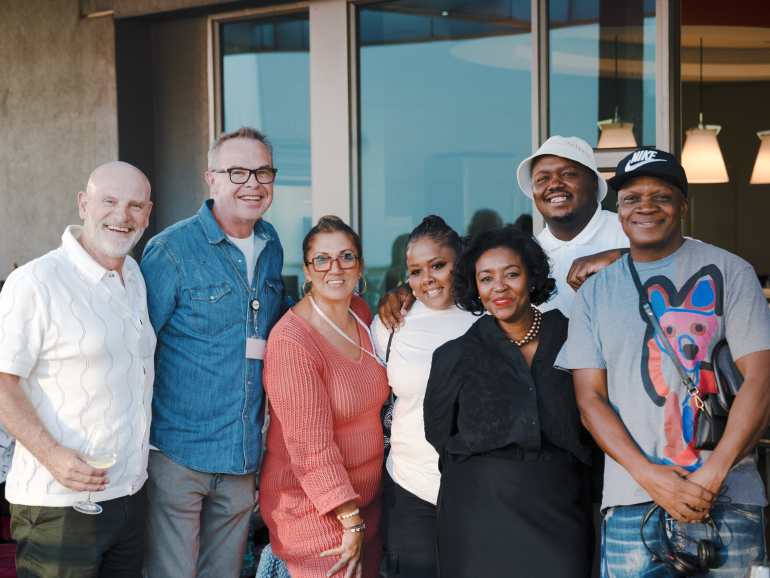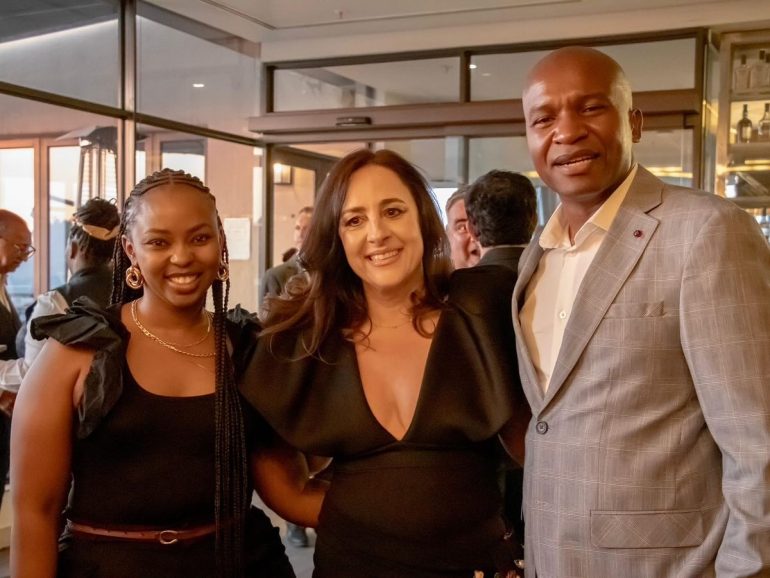- home Home
- keyboard_arrow_right PRESS OFFICE
- keyboard_arrow_right Posts
- keyboard_arrow_rightThe Rebirth of Black Excellence with Dr John Kani
The Rebirth of Black Excellence with Dr John Kani
Black Panther, the iconic superhero film based on an African superhero, has South Africans questioning how the country can move from having small pockets of black excellence to creating a space with multiple success stories.
Acclaimed actor and star of the Black Panther movie, Dr John Kani, was invited by Castle Milk Stout to a panel discussion on ‘black excellence’ with actor, writer and performance poet, Lebo Mashile.
The table has been set, we’re taking our seats and ready for a conversation with Dr John Kani brought to you by @CastleMilkStout.#BlackExcellence #SavourYourRichness #BlackPanther pic.twitter.com/cl6ThN4vJQ
— Kaya 959 95.9 (@kayafm95dot9) February 18, 2018
The movie has resulted in Dr Kani becoming something of a “spokesman for Africa”, responsible for portraying Africa in a positive manner. “It has empowered us as a continent,” said Castle Milk Stout brand manager Keneilwe Pholo. The brand brought Dr Kani and Mashile together to discuss the topic which has been trending on social media since the movie’s premiere on February 16, before an audience of African influencers in creative industries – actors, writers, artists, fashion designers and people working in advertising.
Dr John Kani on negotiating a seat at the table: I adjust my participation in the conversation about excellence because I want to be in the next meeting#BlackExcellence #SavourYourRichness pic.twitter.com/6tZGDiNbaE
— Kaya 959 95.9 (@kayafm95dot9) February 18, 2018
As a language consultant on the movie, Dr Kani was responsible for getting isiXhosa spoken as the indigenous language of Wakanda, the fictional African nation of Black Panther. “In the movie, I greet my son, who I hadn’t seen for a long time, and I told the director I couldn’t do this in English, it needed to be in an African language.”
While “savouring the success of Black Panther,” Dr Kani is keen that his role in the movie be used to inspire Africans to praise their own achievements. “There needs to be an appetite for black excellence. “We have been influential since the diaspora yet faced setbacks in the form of Bantu education and apartheid but continue to fight back.”
Dr Kani said having to communicate in English, a foreign language, meant all ideas were expressed in a watered-down manner. “Black excellence, for me, started at home where I was born. I learnt a sense of self-worth here, my entire life I’ve been royalty. Excellence is a concept, it is within me, the will to do better – but my references are who has been successful before me and in that context.”
Dr Kani said he was at first embarrassed of his success. “It felt like I was boasting. This kills the spirit of creativity – we succumb to fit in.”
The director and playwright said black Africans were “battling within a negotiated acceptance. We are going through the by-products of a struggle for liberation which became democracy.” He
said the word democracy came as a shock during negations, “we had to look up in the dictionary what this meant”.
“Black South Africans are negotiating for a space in the industry, yet we are the majority.
To applause, Dr Kani said that the black voice in boardrooms was often heard as: “Here we go again”. “Then you back down because you want to be seated there again. Often you find blacks who speak the language of the boardroom so well they will tell you to slow down. Disempowerment can come from all sides.”
Dr Kani said the price black people paid for their seat at the boardroom table was silence. “How can we transform corporate organisations while being conscious that challenging the status quo might mean my mother and siblings won’t eat?” he asked.
“So a culture of mediocrity is deliberately created,” responded Mashile.
Discoveries in the Cradle of Humankind have revealed that Africa is the birthplace of mankind. “This means that Africans from all over the world originate here. We can stop thinking about being different. We need courage not to be threatened and intimidated by radical ideas that might upset the apple cart. Don’t feel you must tow the line of conversation just because you came into the boardroom yesterday and it has been around for 50 years.”
Appreciating theatre and art would kickstart the South African entertainment industry, Kani said.
“We do not read in this country. There is no market for those who write books. You can’t write in an African language because bookshops won’t stock them. We need to encourage education which is aligned with employment opportunities. People are leaving institutions with words of congratulations and good luck, but we need to increase the appetite of our people for more knowledge and education. We are the stumbling block to our own success.”
Mashile asked Dr Kani what he believed the tools for succeeding in a racist, post-colonial society, “built by the sweat of our hands” were.
“Every struggle begins with self”, said Dr Kani. “This must be the foundation of our context. Don’t be prepared to compromise. I had years of unemployment because I would not play a role that calls me a boy, or where a woman or child is abused. I knew I needed one break it came in 1977. So you need to know that it starts with you.”
In closing, Mashile said the issue of recognising black excellence could not be resolved in an hour’s conversation. “We need to dedicate our life’s work to achieving this.”
Dr Kani said African talent had been railroaded. “Don’t think this movie will automatically restore the order. We are not Marvel Studios, we don’t have $600-million to change our situation, but we must be inspired to make a change on a daily basis.”
Written by: Kayafm Digital
Similar posts
MORE ARTICLES

SA Powerball Results for tonight: Tuesday, 01July 2025

Zenande Mfenyana captures viewers’ hearts as Thumeka on ‘Inimba’

WATCH: Scorpion Kings begin preparations to ‘Fill Up’ Loftus Stadium

The best of Point of View: DA dares Ramaphosa, Nairobi protests turn deadly and Chrispin Phiri in the spotlight

New month brings new electricity bills for City Power customers
QUICK LINKS
UpComing Shows

The Best T in the City
With T Bose
He has held it down in the world of mid-morning radio with the best music, riveting topics, brilliant mixes and interesting guests. Every weekday, The Best T proves why he is the BEST by connecting to you like only your bro or favourite uncle could. He lets his listeners dictate the songs they want to hear in the ever-popular Top 10 at 10, and his Three Teaspoons never run out. Catch The Best T in the City Mondays to Fridays from 09h00 to 12h00.
close
Feel Good
With Andy Maqondwana
Feel good about feeling good! That's exactly what The Feel-Good show is about. An escape from the negativity that surrounds us, indulging you in good feels. Pass it on to one and all. Spread the good feeling around Gauteng with Andy Maqondwana.
close
Kaya Biz
With Gugulethu Mfuphi
The world of business is simplified for you by Kaya Biz with Gugulethu Mfuphi. This fast-paced award-winning business show talks to the corporate giants as well as up and coming entrepreneurs about their wins and challenges. Gugulethu invites guests to offer their analyses of markets and economies, and also delves into issues of personal financial wellness. Kaya Biz airs Mondays to Thursdays 18h00 to 19h00.
close
Point of View
With Phemelo Motene
Point of View with Phemelo Motene delves into the day’s current affairs, touches on real issues that affect people’s daily lives and shares expert advice on questions posed by the audience. Mondays to Thursdays 20:00 to 22:00.
close
959 Music Weekdays
Kaya 959 Hits
Real. Familiar. Memorable. Kaya 959 brings you the music you know and love from our playlist. Uninterrupted. Thursdays 20h00 to 21h00
closeConnect with Kaya 959
DownLoad Our Mobile App
© 2025 Kaya 959 | On The Street On The Air










